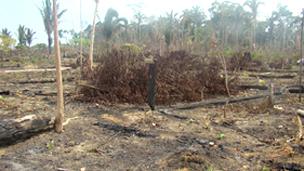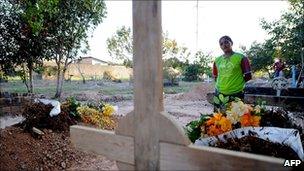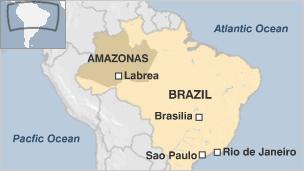Brazil Amazon farmer tells of threats on her life
- Published

Nilcilene has also suffered attacks on her house and crops
"He said he was going to kill me very slowly."
That was the message delivered to Nilcilene Miguel de Lima in May from a gunman hired to murder her.
Nilcilene, a smallholder and head of the local farmers' association, was living in Labrea, a town in Brazil's Amazonas state.
She had been there for seven years after being granted land by Brazil's agrarian reform agency (Incra).
But after a series of attacks, culminating in the chilling death threat, she didn't hesitate. She fled and is now being protected by the Catholic Church's Pastoral Land Commission (CPT).
Since May, six rural workers have been killed in northern Brazil - and Nilcilene didn't want to be next.
"My dream was to have my own land and I managed that. But they beat me up, they burned down my house, my crops. I've suffered all this but nothing has been done about it," she told BBC Brasil in a telephone interview.
"I want to go back and rebuild everything, but I won't be able to stand it, because I know I am going to die. I don't know if one day I'll have a quiet life there but just thinking about it makes me feel ill."
Nilcilene and her husband, Raimundo de Oliveira, are on a list of farmers in the region who have had death threats.

Recent murders have prompted the federal government to act
The CPT passed on the names to the government, which has set up a crisis cabinet to tackle the problem.
While Nilcilene is in hiding, Raimundo has stayed in Labrea.
"He's running a big risk, but he says he's not leaving there unless they carry him out feet first," she says.
Nilcilene is suffering several health problems, including high blood pressure, and has to take medication to sleep - all, she says, the result of the stress she is going through.
"I have such headaches, I am so nervous I feel pain all over."
Nilcilene says her situation worsened in May when Brazil's environment agency, Ibama, carried out raids on illegal logging operations in the area.
The loggers thought she had tipped off Ibama.

Nilcilene says that on the orders of a local logger, a gunman waited for three days close to her house, waiting to ambush her.
When Nilcilene did not show up, he approached her sister-in-law, who usually went everywhere with her.
"He told her that she was getting in the way and that if she didn't clear off, she would die too. He said that he was going to kill me really slowly," Nilcilene says.
She says she tried, in vain, to turn to the police and local authorities, but no one wanted to take her seriously.
She says that finally, after insisting, she was able to file a report but the official police version made no reference to the attacks on her and her property.
Nilcilene's case is being studied by the Human Rights Secretariat and the person alleged to have masterminded the attempt on her life is being investigated by local police.
For Nilcilene, the biggest problem is the impunity enjoyed by those who order such attacks.
"The people who are in charge there (in the Amazon) are the loggers. There's no state, no justice, no environment (ministry) - there's no authority at all."
The CPT says that in 2010, 34 rural workers were murdered, compared with 26 the year before.
Most of the killings were in the north and the north-east of Brazil.
After the recent murders, President Dilma Rousseff set up an inter-ministerial group to discuss the problem of rural violence.
Public Security Secretary Regina Miki, who is also the group's spokeswoman, says it is vital that people who are threatened contact a crime prevention helpline (Disque Denuncia).
Asked about the difficulties Nilcilene faced in making a complaint, Ms Miki said the police could not - or should not - have refused to file a report.
Ms Miki says that the government is offering general protection to those who have been threatened.
"We offer personal security when the threat is more imminent," she told BBC Brasil.
The CPT, however, argues that boosting security is not the answer but rather investigating crimes and punishing those found guilty.
The government is committed to long-term policies to tackle the problem of rural killings, Ms Miki said.
"We can't have police officers there for ever. We have to find alternatives, including speeding up agrarian reform in a sustainable way, so these people can remain on their land in safety."
Reversioned from the original Portuguese by Liz Throssell, BBC News
- Published31 May 2011
- Published25 May 2011
- Published25 May 2011